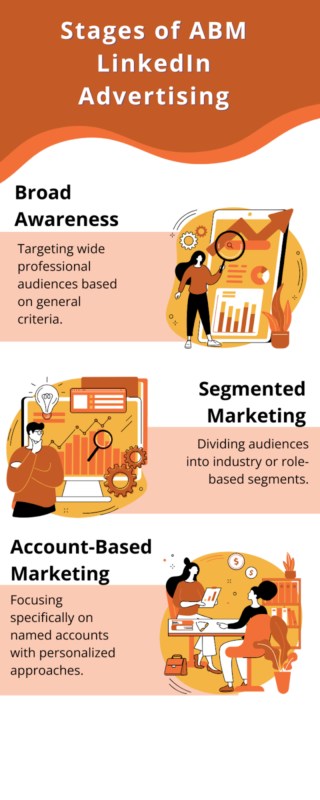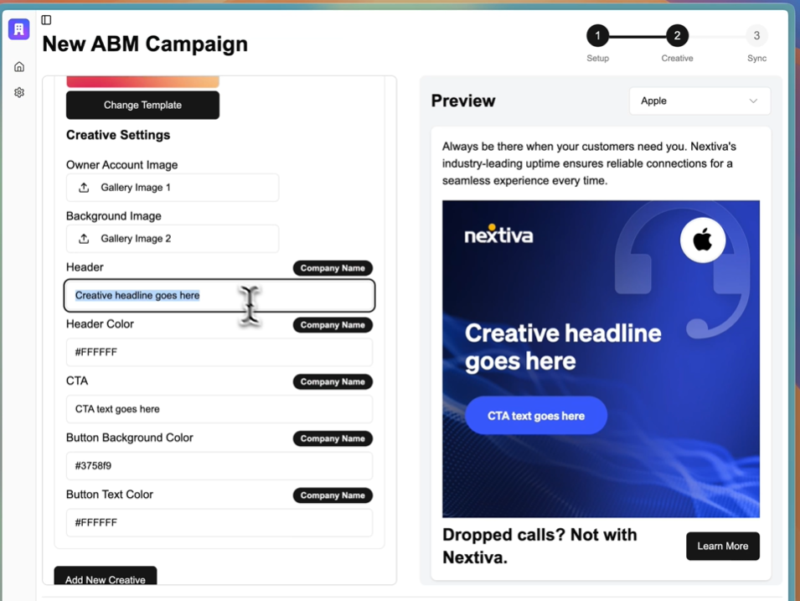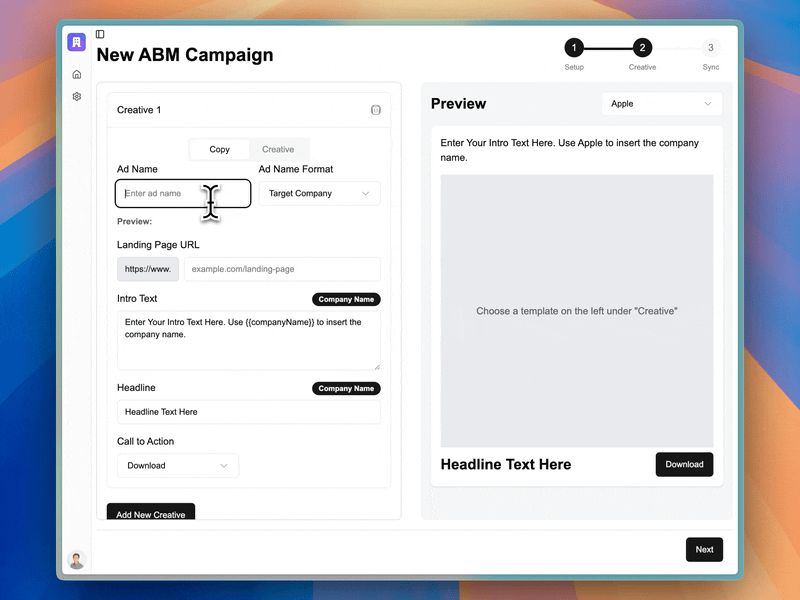Personalized LinkedIn ads are vital to an account-based marketing (ABM) campaign. Single Grain Marketing uses Karrot.ai to optimize LinkedIn advertising for our clients.
What are other ways that businesses can boost their LinkedIn strategy for ABM? Brands can personalize ads and organic posts to complement their ABM strategy.
Here are recent success stories where we reinvented our client’s ABM campaigns with LinkedIn ads.
Key Highlights
- B2B companies implementing ABM on LinkedIn report 91% higher conversion rates than those using traditional approaches
- 208% revenue increase is possible with a well-executed LinkedIn ABM strategy
- Case studies show that personalized LinkedIn ABM campaigns can reduce sales cycles by 30-40%
- AI-powered personalization tools like Karrot.ai have helped companies achieve 3-4X ROI on LinkedIn ad spend
- Cross-functional alignment between sales and marketing teams is a shared success factor across case studies
- Multi-touch attribution models reveal that LinkedIn ABM influences 73% of total revenue from target accounts
- Continuous optimization based on performance data can improve campaign ROI by 30% over time
- Successful companies treat LinkedIn ABM as an ongoing program rather than a one-time campaign
TABLE OF CONTENTS:
The Evolution of LinkedIn Advertising for B2B
Since its inception in 2003, LinkedIn has long been recognized as the premier platform for B2B marketing. Still, the platform has evolved significantly in recent years. LinkedIn was first developed as a networking tool, but is now one of the most effective marketing platforms.
Powerful advertising tools and targeted ABM strategies represent a fundamental reinvention of how B2B companies leverage LinkedIn for business growth.
67% of brands use ABM, and LinkedIn is a primary channel for many campaigns. 97% of marketers report that ABM delivers a higher return on investment than traditional marketing strategies.
From Mass Marketing to Precision Targeting
Casting a wide net doesn’t work for ABM. Precise targeting is the core of every ABM campaign, and brands use personalized messaging to keep accounts in the sales funnel.

The journey from traditional LinkedIn advertising to ABM-driven approaches typically follows three stages:
- Broad awareness: Targeting wide professional audiences based on general criteria.
- Segmented marketing: Dividing audiences into industry or role-based segments.
- Account-based marketing: Focusing specifically on named accounts with personalized approaches.
Companies that have successfully made this transition report significant improvements in campaign performance. For example, ABM strategies increase pipeline conversions by 14%.
Success Story 1: Tech Company Transforms Pipeline with LinkedIn ABM
A mid-sized enterprise software company faced long sales cycles and difficulty penetrating target accounts. Their traditional LinkedIn advertising approach generated awareness but failed to convert high-value prospects into sales opportunities.
The Challenge
- 12-18 month sales cycles for enterprise deals.
- Low engagement rates from key decision-makers.
- Difficulty standing out in a crowded market.
- Limited marketing resources to target hundreds of accounts.
The ABM Transformation

The company implemented a comprehensive LinkedIn ABM strategy:
- Identified 250 target accounts based on ideal customer profile analysis.
- Created account-specific messaging addressing unique pain points.
- Deployed personalized LinkedIn ads using Karrot.ai for scale.
- Coordinated marketing and sales outreach through an integrated playbook.
- Implemented closed-loop reporting to track impact on pipeline.
The Results
The effect of this approach was transformative:
| Metric | Before ABM | After ABM | Improvement |
|---|---|---|---|
| Target Account Engagement | 12% | 47% | +292% |
| MQL-to-Opportunity Conversion | 8% | 23% | +188% |
| Average Sales Cycle | 14 months | 9 months | -36% |
| Pipeline Value | $4.2M | $12.8M | +205% |
| Marketing-Influenced Revenue | $1.8M | $7.2M | +300% |
Key success factor: The company attributed much of its success to the personalization capabilities provided by Karrot.ai, which allowed it to create account-specific creatives at scale without overwhelming its marketing team.
Success Story 2: Manufacturing Firm Reinvents ABM for Complex Sales
A global manufacturing company struggled to reach multiple stakeholders within their target accounts, resulting in fragmented conversations and stalled deals.
The Challenge
- Complex buying committees with 8-12 stakeholders.
- Diverse concerns across technical, financial, and operational roles.
- Difficulty maintaining consistent messaging across touchpoints.
- Limited visibility into account engagement.
The ABM Transformation
The company implemented a role-based LinkedIn ABM approach:
- Mapped buying committees within each target account.
- Developed role-specific messaging for different stakeholders.
- Created a multi-wave LinkedIn campaign with sequenced content.
- Implemented account-based retargeting to reinforce key messages.
- Coordinated digital and sales touchpoints through an integrated CRM.
The Results
The structured approach delivered impressive results:
| Metric | Before ABM | After ABM | Improvement |
|---|---|---|---|
| Stakeholder Coverage | 23% | 72% | +213% |
| Multi-Stakeholder Engagement | 7% | 38% | +443% |
| Opportunity Creation Rate | 11% | 29% | +164% |
| Average Deal Size | $420K | $680K | +62% |
| Win Rate | 22% | 37% | +68% |
Key success factor: The company highlighted the importance of role-based personalization in addressing the specific concerns of different stakeholders within the buying committee, creating a more cohesive path to purchase.
Success Story 3: Financial Services Firm Scales ABM with AI
A financial services technology provider wanted to target thousands of potential clients but struggled with the resource requirements for true personalization at scale.
The Challenge
- Need to target 2,000+ financial institutions.
- Limited creative resources for personalization.
- Difficulty maintaining brand consistency across variations.
- Inability to optimize in real-time across many segments.
The ABM Transformation
The company implemented an AI-powered LinkedIn ABM strategy:
- Segmented target accounts into 12 distinct categories.
- Created base creative templates for different ad formats.
- Deployed Karrot.ai to generate personalized variations at scale.
- Implemented automated optimization based on engagement data.
- Developed a closed-loop measurement system for continuous improvement.
The Results
The AI-enhanced approach delivered exceptional results:
| Metric | Before AI-ABM | After AI-ABM | Improvement |
|---|---|---|---|
| Personalized Account Coverage | 5% | 100% | +1900% |
| Click-Through Rate | 0.8% | 2.7% | +238% |
| Cost Per Qualified Lead | $175 | $68 | -61% |
| Pipeline Velocity | 82 days | 51 days | -38% |
| Marketing ROI | 2.1X | 7.4X | +252% |
Key success factor: The company credited Karrot.ai’s ability to generate thousands of personalized creative variations while maintaining brand consistency as the critical enabler for their scaled ABM approach.
Success Story 4: Healthcare Company Drives ROI with Integrated ABM
A healthcare technology provider struggled to demonstrate clear ROI from their marketing efforts, making it difficult to secure budget for expanded initiatives.
The Challenge
- Complex attribution due to long sales cycles
- Multiple touchpoints across digital and physical channels
- Difficulty connecting LinkedIn activities to revenue outcomes
- Skepticism from leadership about marketing impact
The ABM Transformation
The company implemented a comprehensive measurement approach:
- Established clear KPIs aligned with business outcomes.
- Implemented multi-touch attribution across all channels.
- Created a unified data warehouse connecting marketing and sales data.
- Developed executive dashboards showing pipeline impact.
- Implemented regular ROI reviews with leadership.
The Results
The measurement-focused approach transformed perception and performance:
| Metric | Before Integrated Measurement | After Integrated Measurement | Improvement |
|---|---|---|---|
| Attributed Pipeline | $3.2M | $11.7M | +266% |
| Marketing Budget | $1.2M | $2.8M | +133% |
| Cost Per Opportunity | $14,200 | $8,400 | -41% |
| LinkedIn ABM Investment | $180K | $720K | +300% |
| Overall Marketing ROI | 2.7X | 4.2X | +56% |
Key success factor: The company emphasized the importance of connecting LinkedIn ABM activities to revenue outcomes through robust attribution modeling, which improved performance and resulted in a more significant investment in their ABM program.
Common Success Patterns Across Case Studies
Analyzing these success stories reveals several common patterns that contributed to exceptional results:
1. Strategic Account Selection
Successful companies invested significant effort in identifying the correct target accounts:
- Used data-driven approaches to define ideal customer profiles.
- Prioritized accounts based on potential lifetime value.
- Segmented accounts for more relevant messaging.
- Regularly refined target account lists based on performance.
Organizations with a strong ideal customer profile (ICP) achieve 68% higher account win rates than those using basic targeting approaches.
2. Cross-Functional Alignment
High-performing ABM programs established strong alignment between sales and marketing teams:
- Created shared goals and metrics
- Developed integrated playbooks for account engagement
- Established regular coordination meetings to discuss account progress
- Implemented unified technology systems for visibility across functions
Companies with aligned sales and marketing teams are 6% more likely to exceed revenue goals, making this a critical success factor for LinkedIn ABM.
3. Personalization at Scale
The most impressive results came from companies that achieved true personalization without overwhelming resources:
- Implemented modular creative approaches for efficient customization.
- Leveraged AI tools like Karrot.ai to automate personalization.
- Created account-specific messaging addressing unique pain points.
- Developed role-based content for different stakeholders.
This way, brands delivered relevant experiences while using AI to analyze large datasets, cutting out a significant portion of manual work.
Companies implementing 1-1 personalized LinkedIn ads with tools like Karrot.ai report conversion rate improvements of up to 70% compared to generic campaigns.
4. Continuous Optimization
Successful programs treated ABM as an ongoing process of refinement:
- Established regular review cadences for campaign performance.
- Implemented A/B testing to refine messaging and creative.
- Adjusted targeting based on engagement patterns.
- Reallocated budget to highest-performing segments and tactics.
Post-campaign optimization of LinkedIn ABM efforts can improve performance by 30% in subsequent campaigns, highlighting the importance of continuous refinement.
Implementing Success Patterns in Your LinkedIn ABM Strategy
Based on these success stories, here are key recommendations for implementing an effective LinkedIn ABM strategy:
Start With a Solid Foundation
- Define clear objectives aligned with business goals
- Develop a robust ICP based on your best customers
- Create a tiered account strategy to focus resources appropriately
- Establish baseline metrics for measuring improvement
Build Cross-Functional Processes
- Create a dedicated ABM team with representatives from marketing and sales
- Develop shared account plans for top-tier targets
- Implement regular coordination meetings to discuss progress
- Align incentives around account outcomes rather than activities
Leverage Technology Strategically
- Implement an integrated tech stack connecting LinkedIn, CRM, and marketing automation.
- Consider AI-powered tools like Karrot.ai for personalization.
- Develop a unified data model for consistent measurement.
- Automate routine tasks to focus human resources on strategy.
Measure What Matters
- Implement multi-touch attribution to connect activities to outcomes.
- Track engagement at the account level rather than just individual leads.
- Measure pipeline velocity to assess impact on sales cycles.
- Calculate true ROI based on influenced revenue.
Use LinkedIn Ads to Achieve ABM Success
The success stories highlighted in this article demonstrate the transformative potential of reinventing LinkedIn advertising through ABM strategies. When done accurately, brands can achieve an impressive ROI and a healthy number of accounts in the sales funnel.
These success stories share many common factors. They focused on strategic account selection, cross-functional alignment, personalization at scale, and continuous optimization, which resulted in improved engagements, conversion rates, and revenue growth for these B2B companies.
There are still other ABM best practices that can achieve the best ROI. Don’t cast a wide net and focus on targeting businesses and professionals in your ICP. Use precise marketing and personalization to create relevant experiences. Consider how automation tools like Karrot.ai can help you achieve personalization at scale.
Apply the lessons from these success stories to create a structured approach that aligns with your specific business objectives and target accounts.




